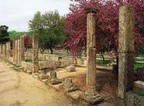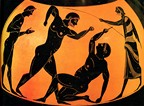Of all the Panhellenic Games in ancient Greece, the most important took place at Olympia “As water is the most precious of all elements, such as gold emerges as the most expensive among all commodities, and as, finally, the sun illuminates more than any other star, so the Olympia shines shading any other race “sings Pindar in his first Olympic ode. According to tradition, the first gods fought in Olympia. Zeus defeated Cronus in the fight, Apollo to Mercury and Mars street boxing. Also the ancient sources mention several heroes as founders of the games. In Mycenaean tradition is the myth of Pelops. After the victory over Oenomaos, Pelops founded games in honor of Oinomaos order to be purified, but also to thank the gods for the victory that gave it. The women’s races Hippodamia founded in honor of Hera, called Heraea. So the games were established in Olympia.
The establishment of the ancient greek olympic games, according to other myths, is attributed to demigod Hercules, who founded the races and the chariot. Hercules is the one who brought the olive tree from the land of the Hyperboreans, planted in the sanctuary, and set the boundaries of the sacred Altis.
Also according to other legends, the Ideon Hercules with the four brothers, his finger or Curetes, arrived in Olympia from Crete, defined the length of the stadium, organized races with his brothers and crowned the winner with wild olive. Among the names of the founders of the ancient greek olympic games mentioned also Neleus, Pelias and the Pisos, eponymous hero of Pisatidas. Finally, Strabo believes that the Games were organized by Oxyllo, king of Herakleidon after their descent to Elis
Ancient Greece Olympic Games were later reorganized by Iphitos, which entered into an agreement (the sacred truce) with the king and lawgiver of Sparta Lycurgus and King Cleisthenes of Pisa. So then the Olympia became a center nationwide. The ancient sources say as the year of the games in 776 BC From this year begins the list of Olympians (supplemented of course much later). Pisates were hosting the games between the 688 to 572 BC In 570 BC Eleans conquered Pisa and took over the control of the Games. During the 5th century BC matches reached the zenith of their glory. In the Hellenistic era, however, they lost their original character and turned into a professional sporting event which was consolidated during the Roman era. The major historical events that took place in the course of centuries in Greece, had their impact on sporting ideals of the Olympics, A gradual decline in moral values, exacerbated substantially since 146 AD, when the main Greece was conquered by the Roman state and Greeks lost their independence, led to a decline of the event itself. In the second century AD, when the right of Roman citizenship was gifted to all residents of the Roman Empire, an internationalization of the games occurred.
Eventually the greece olympic games were abolished by Theodosius I in 393 AD (293rd Olympiad), when a decree banned the operation of all pagan temples. But the Greek Olympic Games had already forged a national, racial and spiritual unity of the Greeks. They combined the deep religious spirit of the heroic past of the Greeks, the highest degree of cultivation of body, mind and soul with the universal philosophical values and the promotion of individual and cities with the highest ideal of freedom. The transnational character of the ancient greek olympics survives and modern Olympic Games, after a break of 15 centuries were organized in Athens in 1896, and since then committed every four years.


